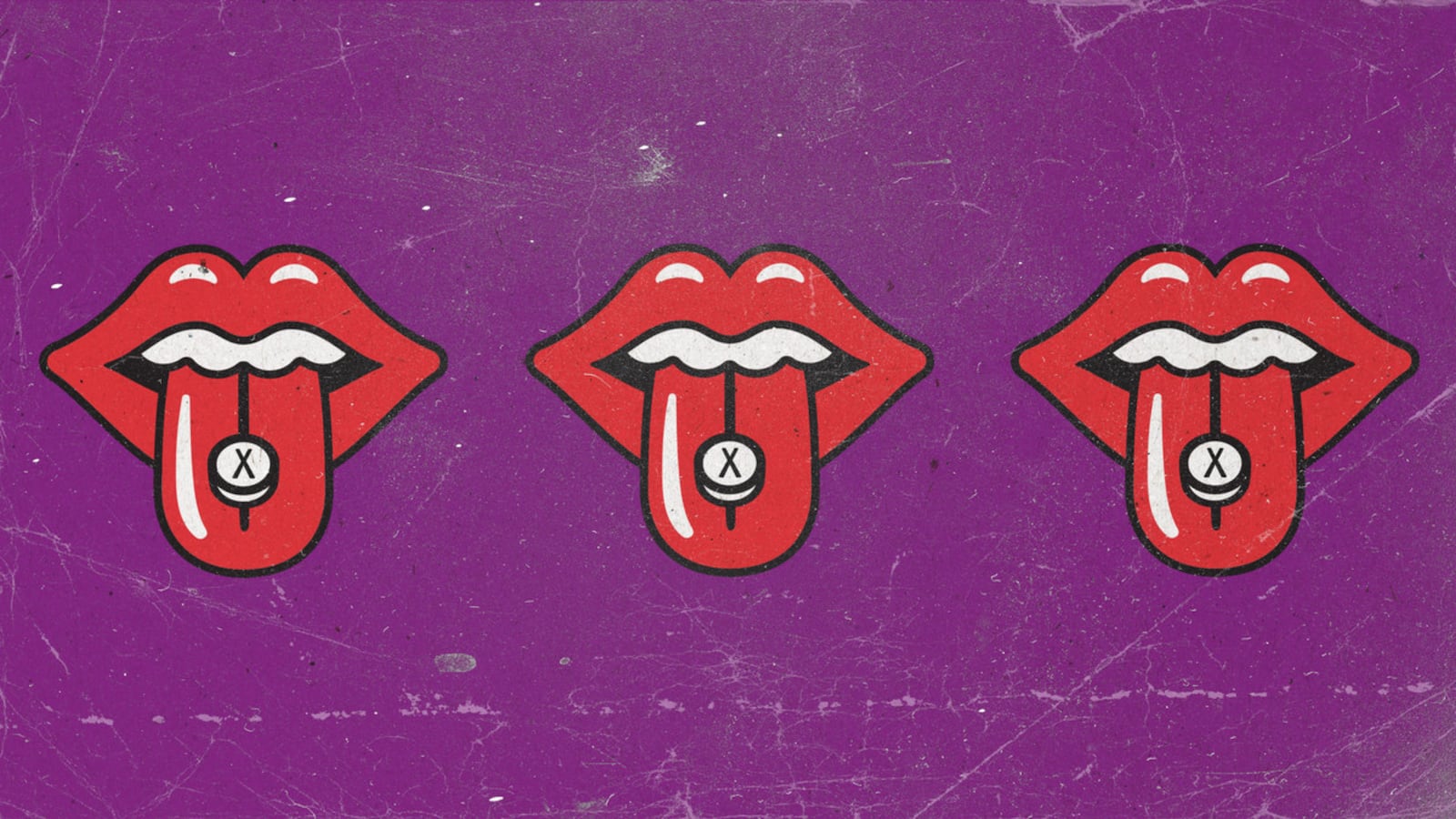When MollyBabes, a community on the vast online forum hub Reddit dedicated to sharing images and videos of women having sex while high on MDMA, launched in 2016, horny internet denizens lavished it with praise. “I didn’t know I needed this,” wrote one Reddit user. “But now I do.”
But r/MollyBabes, as it was identified on the platform, sent up major red flags as well. “This seems a little exploitative, dunnit?” mused one commenter. “Isn’t that illegal?” asked another. “Like, how can you trust a girl’s consent if she’s drugged?”
“The presence of alcohol or drugs does not automatically mean there can be no consent” to sex, Anastasia Powell, author of Sex, Power and Consent, told The Daily Beast. But MDMA can lower users’ inhibitions or sense of risk, impairing their ability to consent to engage in, record, or distribute recordings of sex acts. So there was good reason to worry that the forum might host non-consensually produced or distributed pornography, including potential recordings of assault or rape.
Reddit itself validated such concerns in February 2018, when it banned r/MollyBabes. “We are clear in our site-wide policies that involuntary pornography is prohibited,” Reddit told The Daily Beast. “The subreddit in question was banned in accordance with this policy.”
That move, MaryJaneandMolly—the username of the community’s creator and moderator, who stopped responding to messages before their identity could be determined—wrote to The Daily Beast, made them “angry and frustrated.” They’d worked hard to build a hub for a category of “hard to find porn,” which they said they’d gotten hooked on after having sex while rolling, and loving it.
In September 2018, MaryJaneandMolly rebuilt the community on a new, monetized website, which they posted about and linked to on a number of Reddit channels. “I really liked molly porn,” they stressed to The Daily Beast, “and [the site] was easy to make.”
As of early February, the MollyBabes site had over 13,500 registered users, although fewer than 100 paid monthly fees to access locked videos.
Experts on the intersections between porn, consent, and the law said the problems with the Reddit community persisted on the new site.
“Some of the images on MollyBabes are of women who appear unaware that they are being recorded, or so drug-affected that they appear incapable of consent,” said Powell. “There’s clearly stuff that’s not meant to be here,” added Elisa D’Amico, of law firm K&L Gates’s Cyber Civil Rights Legal Project, who specializes in non-consensual porn cases.
MollyBabes’s rebirth and flourishing speaks to serious gaps in our ability to detect and react to dubious adult sites. Its persistence in the wake of a decade of high-profile stories on the spread of non-consensual porn—and the serious mental health toll that can take on victims—was also alarming. Earlier this year, the singer Madison Beer opened up on Twitter about the anxiety she’s felt after years of seeing intimate images she sent someone as a teen cropping up repeatedly online.
But in late February, after The Daily Beast asked MaryJaneandMolly a number of questions about MollyBabes and its content, the site—and its creator’s digital presence—vanished. While they fervently defended their content, scrutiny clearly had them spooked. “Should I delete the site and avoid any issues or keep it going and hope no issues come,” they mused in a message to The Daily Beast. “I’m leaning towards the former option.”
“What I am worried about,” they admitted, “is if I will somehow go to jail for running a porn site based on having sex on molly… Hopefully the article you put out doesn’t ruin me.”
There are rarely, if ever, clear cues in a porn image or video indicating that it was shot or shared without a subject’s knowledge or consent. It can also be difficult at times to tell if someone is high, or just convincingly acting, much less whether they were so high that consent concerns come into play. (MollyBabes had a rating system for users to flag suspected acting. It deleted low-rated content, apparently to try to ensure it featured as much genuinely high sex as possible.) Even if pictured people are definitely wasted, it is possible they consented to have and record sex while high ahead of time, felt in control during sex, and later cleared distribution with each other.
One MollyBabes user who posted several images of his partner nude and rolling on MDMA told The Daily Beast that they made all of their content conscientiously and sought mutual consent before uploading it to affinity sites, which, he said, they have done many times. “We had the majority of our content uploaded on my Tumblr, Lord Shrooms,” he told The Daily Beast. “We shared our love for 123,000 followers… I love being watched, in video or in person.”
Yet MaryJaneandMolly admitted that most of the content users posted was collected from across the internet, and as such was almost certainly not content they were involved in making or had explicit permission to post. Powell stressed that even if the site did not focus on or actively solicit non-consensual material explicitly, the nature of its brand “makes it highly likely that some of the images posted by users would violate laws criminalizing image-based abuse.”
When people produce and disseminate porn to humiliate or harm someone, they often share it on highly visible social media platforms, or via text or email with a victim’s friends or family, and identify them explicitly in subject lines, titles, captions, and so on. That content is intentionally easy to spot, although trauma and stigma lead many victims to forego reporting it.
Yet “some perpetrators are motivated by making money, or by gaining status in a community for sharing the best or most authentic imagery,” Powell said, not by the urge to name and shame. She and her colleagues have found many small sites trading in non-consensual porn that do not focus on doxxing. They are hard for even experts to locate. This means, Powell said, “that many victims of image-based abuse are unlikely to be aware that their images have been published.”
MollyBabes fit the bill of a potential under-the-radar non-consensual porn haven. It was mainly known within a small fetish community. None of the over 500 videos visible on the free portion of the site included identifying text. Most comments focused on attempts to parse whether or not individuals in a clip were really rolling on MDMA, or general praise for sex on drugs.
“Her pupils are huge and she keeps grinding her teeth she’s rolling so hard [sic],” read one. “This is what it’s all about!” ran another.
It is easy to brush undetected non-consensual clips off, arguing that if no one featured has been doxxed, then they don’t do any real damage. But the longer such content spends unaddressed on one site, the further it usually spreads, the greater the chance of someone a victim knows finding and using it to harm them, and the harder it will be to scrub it from the internet.
Months after the site’s collapse, there are currently a number of videos featuring a MollyBabes watermark on more mainstream adult video sites.
“There are laws criminalizing [non-consensual pornography] in 46 states, plus D.C.,” said D’Amico. But that does not mean if someone found non-consensual porn featuring themself on MollyBabes it would have been easy to act.
MaryJaneandMolly encouraged potential users to create accounts using dummy addresses, ostensibly to avoid the stigma of anyone potentially linking them to a fetish community. But this and other workarounds make identifying posters to prosecute very difficult. In the majority of states with laws against non-consensual pornography, you also have to prove that someone posted content explicitly out of malice. That’s hard to prove in general. It may be even harder to prove if non-consensual porn was first posted to a site like MollyBabes, self-professedly focused on love and appreciation.
What’s more, D’Amico noted, many courts maintain that if you engage in sexual acts in public spaces, like clubs or festivals, you don’t have a reasonable expectation of privacy. So that may preclude taking action against anyone on non-consensual content creation or sharing grounds.
Most sites readily take down content if someone complains that it is non-consensual. But as long as they don’t actively solicit non-consensual content, and put magic words into their terms of service—as MollyBabes did—the American legal system (generally) indemnifies them against responsibility for what their users post.
A few adult sites still try to actively limit the spread of non-consensual porn on their platforms. But these efforts are rarely enough. D’Amico has seen guides instructing people in how to get around safeguards, and as Motherboard has reported, Pornhub and other tube sites are still regularly accused of hosting non-consensual pornography that their systems may not have detected, responding slower than one might hope in some cases, and failing to prevent altered versions of some clips from proliferating after they’ve initially been taken down.
Still, at the very least, efforts by some sites serve as important signals about what is acceptable.
For their part, MaryJaneandMolly argued MollyBabes had a copyright infringement reporting tool. They said the site only ever received 10 copyright complaints, and those were all from porn stars or producers. They said they took them all down.
But copyright protections, though a powerful tool against some forms of non-consensual porn, are not universal solutions.
Powell observed that MollyBabes did not feature explicit language about non-consensual content. At best, this suggests MaryJaneandMolly did not think through the full risks and realities of their site, or the noxious material it might invite. At worst, it suggests they only cared about doing what they needed to do to minimize the most glaring risks of legal exposure. “I’ve looked into the laws” the creator told The Daily Beast, and believed the site was legally aboveboard. But “if this website is illegal, I am deleting it the second I find out,” they added. “I don’t wanna go to jail.”
Barring (unlikely) major legal overhauls, there is no clear or systemic way to tackle sites like MollyBabes and the risks they can pose. But that doesn’t mean these sites are untouchable.
After The Daily Beast confronted MaryJaneandMolly with questions and concerns about their site, they defended it. But they also relented and said that Reddit was right to ban the original channel, even if they thought the site’s enforcement of consent policies has been piecemeal.
That concession might have stemmed from a change of heart: MaryJaneandMolly told The Daily Beast they had moved away from drug-fueled parties and sex in their own life. The idea of sex on MDMA “grosses me out” now, they added.
Yet they kept the site running, at least for a time, after that personal pivot. It seems it was only outside scrutiny from a media outlet that pushed them to finally pull the plug. “If this creation will start to cause trouble for people… I will delete it without a second thought,” they told The Daily Beast. “I couldn’t imagine the hell I would go through if the website becomes an international outrage.”
Within about a week of writing that, MaryJaneandMolly scrubbed their Reddit account and the MollyBabes site went down. It’s possible they were just lying low until they thought the heat was off—though it remained down after over two months of pandemic lockdown.
It’s also possible a small dose of sunlight forced them to reevaluate the implications of their site in a harsh new light, and kill it for good.



